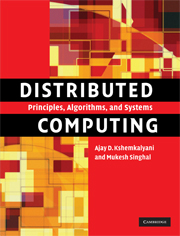Book contents
- Frontmatter
- Contents
- Preface
- 1 Introduction
- 2 A model of distributed computations
- 3 Logical time
- 4 Global state and snapshot recording algorithms
- 5 Terminology and basic algorithms
- 6 Message ordering and group communication
- 7 Termination detection
- 8 Reasoning with knowledge
- 9 Distributed mutual exclusion algorithms
- 10 Deadlock detection in distributed systems
- 11 Global predicate detection
- 12 Distributed shared memory
- 13 Checkpointing and rollback recovery
- 14 Consensus and agreement algorithms
- 15 Failure detectors
- 16 Authentication in distributed systems
- 17 Self-stabilization
- 18 Peer-to-peer computing and overlay graphs
- Index
14 - Consensus and agreement algorithms
Published online by Cambridge University Press: 05 June 2012
- Frontmatter
- Contents
- Preface
- 1 Introduction
- 2 A model of distributed computations
- 3 Logical time
- 4 Global state and snapshot recording algorithms
- 5 Terminology and basic algorithms
- 6 Message ordering and group communication
- 7 Termination detection
- 8 Reasoning with knowledge
- 9 Distributed mutual exclusion algorithms
- 10 Deadlock detection in distributed systems
- 11 Global predicate detection
- 12 Distributed shared memory
- 13 Checkpointing and rollback recovery
- 14 Consensus and agreement algorithms
- 15 Failure detectors
- 16 Authentication in distributed systems
- 17 Self-stabilization
- 18 Peer-to-peer computing and overlay graphs
- Index
Summary
Problem definition
Agreement among the processes in a distributed system is a fundamental requirement for a wide range of applications. Many forms of coordination require the processes to exchange information to negotiate with one another and eventually reach a common understanding or agreement, before taking application-specific actions. A classical example is that of the commit decision in database systems, wherein the processes collectively decide whether to commit or abort a transaction that they participate in. In this chapter, we study the feasibility of designing algorithms to reach agreement under various system models and failure models, and, where possible, examine some representative algorithms to reach agreement.
We first state some assumptions underlying our study of agreement algorithms:
Failure models Among the n processes in the system, at most f processes can be faulty. A faulty process can behave in any manner allowed by the failure model assumed. The various failure models – fail-stop, send omission and receive omission, and Byzantine failures – were discussed in Chapter 5. Recall that in the fail-stop model, a process may crash in the middle of a step, which could be the execution of a local operation or processing of a message for a send or receive event. In particular, it may send a message to only a subset of the destination set before crashing. In the Byzantine failure model, a process may behave arbitrarily.
[…]
- Type
- Chapter
- Information
- Distributed ComputingPrinciples, Algorithms, and Systems, pp. 510 - 566Publisher: Cambridge University PressPrint publication year: 2008
- 1
- Cited by



